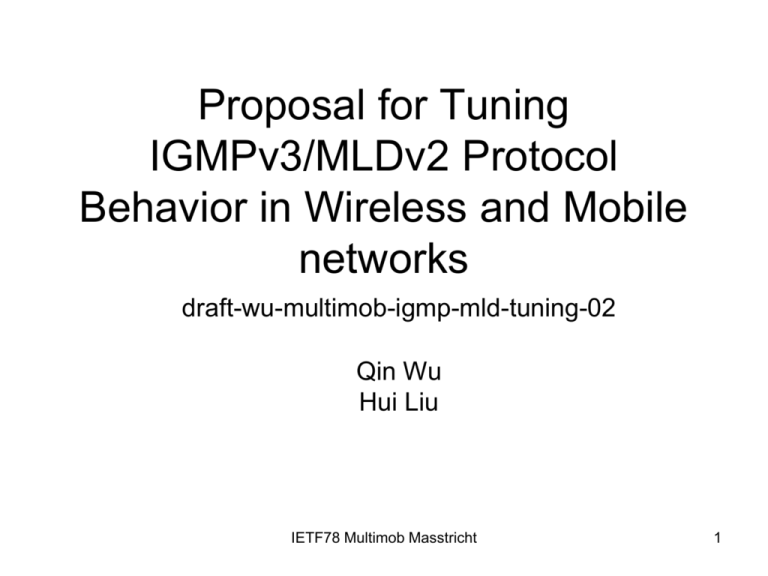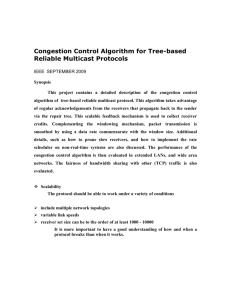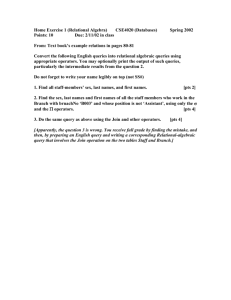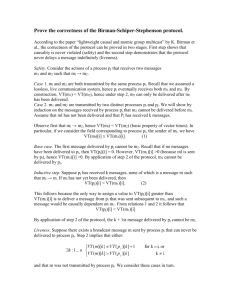multimob
advertisement

Proposal for Tuning IGMPv3/MLDv2 Protocol Behavior in Wireless and Mobile networks draft-wu-multimob-igmp-mld-tuning-02 Qin Wu Hui Liu IETF78 Multimob Masstricht 1 Status • Second Presentation in the Multimob • Changes since -01 (Presented in Anaheim) – Remove Optimization Consideration for Report Messages – Remove the optimization method for Limiting the scope of periodical Queries – Highlight the explicit tracking feature – Add Link model analysis for wireless multicast – Comparison between wired multicast and wireless multicast – Add Report Suppression Support – Add Query Suppression Support IETF78 Multimob Masstricht 2 Comparison between IGMPv2/MLDv1 and IGMPv3/MLDv2 IETF78 Multimob Masstricht 3 Comparison between wired multicast and wireless multicast IETF78 Multimob Masstricht 4 Wireless Link Models Analysis IETF78 Multimob Masstricht 5 Router behavior for tuning optimization • Explicit Tracking of hosts • Suppression Consideration – Report Suppression for the hosts – Query Suppression for the routers • Using Unicast Query – Collecting membership by Using General Query with Unicast Query – Switching Between Unicast Query and Multicast Query • Link Type Consideration – Filtering unwanted multicast packets based on link type – Tuning Response Delay according to link type and status • • Minimizing General Periodical Query Frequency by increasing interval each time Multiple Retransmission of Queries on packet loss IETF78 Multimob Masstricht 6 Explicit Tracking of hosts • How to do explicit tracking – The router may use local replication to inspect incoming join and leave requests, – The router records or refreshes the membership state for each host on the interface, – and the router take appropriate action to each received report. – The router builds a table to track which channel being forwarded to each port • How to optimize explicit tracking – Disable Group specific Query or Source-and-Group Specific Queries when explicit tracking is used. – update membership state periodically by using periodical IGMP/MLD Query. – Separation of processing state changing report and current state report IETF78 Multimob Masstricht 7 Suppression Consideration(1) • Report Suppression for the hosts – The router can terminate IGMP/MLD reports coming from hosts, and forwards a summarized version to the router/Querier. – Unsolicited membership reports (channel change requests) are forwarded only the first subscriber joins a multicast group, or the last subscriber leaves a multicast group. This tells the upstream router to begin or stop sending this channel to this router. – Solicited membership reports (sent in response to an query) are forwarded once per multicast group. The router may also aggregate multiple responses together into a single membership report. IETF78 Multimob Masstricht 8 Suppression Consideration(2) • Query Suppression for the routers – The downstream router stop forwarding IGMP/MLD Queries packets sent to the hosts and respond with report as proxy to the upstream router • Never send a specific query to any client • Send general queries only to those clients receiving at least one multicast group IETF78 Multimob Masstricht 9 Link Type Consideration • Filtering unwanted multicast packets based on link type – the multicast capability within a link may cause for a receiver to wake up for unwanted multicast packet – Filtering the multicast packets and delivering the packets to only for receivers that are listening for particular multicast packets – broadcast link model and point to multipoint link model require filtering at the access node to support the dormant mode for the receivers • Tuning Response Delay according to link type and status – If the link type is PTP which means the resource is dedicated for one receiver on each link, then the Maximum Response Delay can be chosen smaller – If the expected number of Reporters is small and the link condition is good, the administrator may choose the smaller Maximum response Delay IETF78 Multimob Masstricht 10 Using Unicast Query • Collecting membership by Using General Query with Unicast Query – Using General Query to collect most of the membership report response – Using Unicast Query to collect the membership report again from each non respondent receiver. • Switching Between Unicast Query and Multicast Query – switch between unicast and multicast Query based on the receiver numbers. IETF78 Multimob Masstricht 11 Mailing List Discussion Summarization • IGMP/MLD proxying – – • Is Wireless link asymmetrical link – – – • the host does not need to spend any processing power to listen and determine whether there are duplicated report message. Using specific queries instead of general queries – – – • wireless link for multicast is possible to be asymmetrical link possible for hosts to send multicast data on a wireless link possible to have one asymmetric link for wired network Host reduce Power consumption by removing host suppression – • based on the aggregate state it sends messages upstream. send general queries downstream, independently of when the upstream sends them miss lots of solicited report which is early used to do membership state update and new group collection on the router if the router never received an unsolicited report from the host, then the router can only learn about that group if it sends a general query Remove this case Explicit tracking is mandatory to IGMPv3/MLDv2 – Explicit tracking is allowed, but not mandatory IETF78 Multimob Masstricht 12 Moving Forward • Adopt it as WG item? • Solicit more review and quick Feedback IETF78 Multimob Masstricht 13





